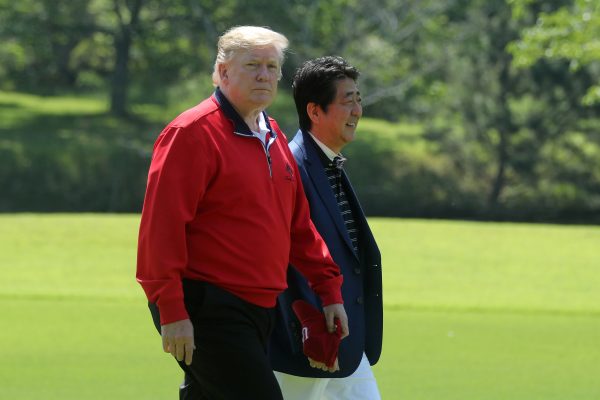Under the Abe administration since 2012, Japan has boosted defence expenditure while changing the legal framework for national security. But few people believe these measures are enough. Japan faces the serious threat of nuclear missile attacks from North Korea. China, whose military strength is increasing dramatically, infringes upon Japan’s territorial waters regularly. Whether Japan can defend the disputed Senkaku/Diaoyu Islands in the long term is uncertain. It is the first time since 1945 that Japan’s own territory is threatened.
Unsurprisingly, Japan’s alliance with the United States remains a pillar of the country’s security. Trump’s public demonstrations of either indecision or ignorance have then been a cause for alarm. When during the 2016 election campaign Trump was asked what he would do as president if the Senkaku/Diaoyu Islands were occupied by China, he answered: ‘Well, I, you know, again, I don’t like to tell you what I’d do, because I don’t want to’.
Yet at the first official summit meeting between Abe and Trump, Abe succeeded in getting Trump to reverse his uncertain position on the Senkaku/Diaoyu Islands. Since that meeting, the security aspect of US–Japan relations has been generally stable, while trade has been a sticking point. Going forward, Abe’s personal ties with Trump may continue to drive the US–Japan relationship.
When it comes to Trump’s inconsistency, it might be that personal relations are of paramount importance for a president who does not have intimate knowledge of or firm principles on foreign affairs. If this is the case, Abe’s intimate approach to diplomacy has been on the right track. He has often played golf with Trump and even wrote a letter recommending Trump for the Nobel Peace Prize.
Certainly, ‘hug’ diplomacy is not enough on some issues. Trump has still imposed tariffs on steel and aluminium imports from Japan. Apparently he argued vehemently with former secretary of defence James Mattis on the merits of the United States staying in NATO and stationing US troops in Syria and South Korea. The worst-case scenario for Japan would have been for Trump to demand trade concessions by threatening not to defend Japan in times of need.
But for Japan, no good will come from inviting Trump’s anger on issues of national security and trade. Abe has found merit in personally ensuring that Trump remembers and hopefully understands Japan’s position on critical issues.
There are cases where these frequent meetings seem to have paid dividends for Abe, the issue of North Korea’s abduction of Japanese citizens being one of them. Apparently Trump raised this issue twice at his February 2019 summit meeting in Vietnam with North Korea’s Chairman Kim Jong-un. For Abe, the abduction issue is still important. He may have asked Trump to convey the message to Kim when he met Trump in April 2019. Kim has reportedly told Trump that he will meet with Abe at some stage.
As host and chair of the June 2019 G20 summit in Osaka, Abe should remember the G7 summit meeting in 2018, where leaders were unable to agree on a joint statement because Trump disagreed with the proposed draft on maintaining the international free trade order. The good news for Abe is that Trump said at the last minute that he would support whatever Abe decided. The bad news is that this kind of hustle might happen again at the June G20 meeting.
Abe’s travel itinerary in April included France, Italy, Canada and the United States, all of whom are participating in the summit in Osaka. Minimising disagreements between the United States and the other countries must have been a priority. Another important objective during Abe’s April meeting with Trump was ensuring that the US President will attend a state dinner in Tokyo in May with Japan’s new emperor (which would make Trump the first foreign dignitary to meet Emperor Naruhito). Trump’s agreement signified another important score.
Bringing trade negotiations to a swift conclusion is also an urgent matter for Abe. Given that US farmers were forced to embrace disadvantages after the United States left the Trans-Pacific Partnership, a quick settlement might be possible.
In sum, Abe’s meeting with Trump in late April had a full agenda, contrary to the impressions held outside government that another meeting was superfluous after so many past meetings. Forging trust between the two leaders was an overarching priority and Abe will likely continue to aim to do so in late May.
Dr Fumiaki Kubo is the A. Barton Hepburn Professor of American Government and History at the Graduate Schools for Law and Politics, the University of Tokyo.


Kubo-san is right to stress Abe’s deep investment in personal relations with Trump. This is necessary for a Japan that is deeply dependent on its bilateral relations with the U.S. The mistake is assuming that friendship with Trump will be a 2 way street. Trump has demonstrated consistently that loyalty runs only one way–you are loyal to me. But if and when it suits me, I will cut you off completely. Abe needs to keep his other options open even as he tries to stay close to Trump.